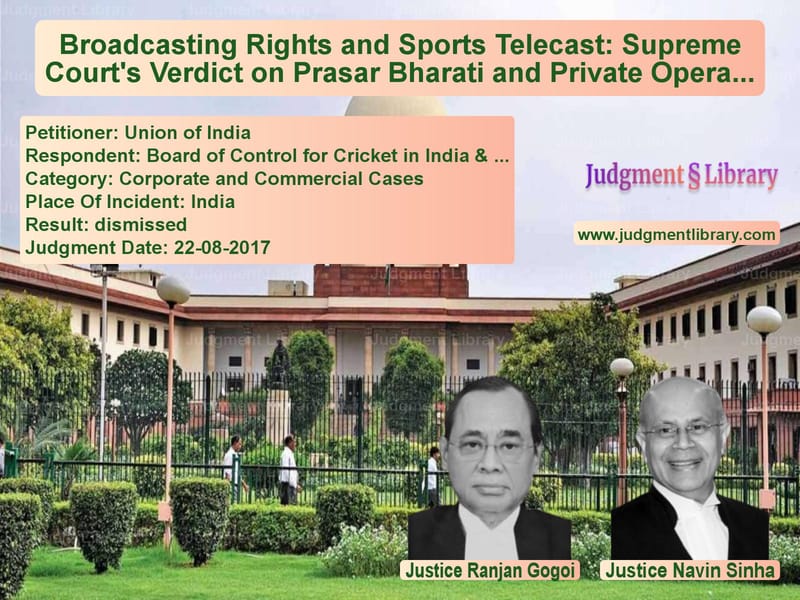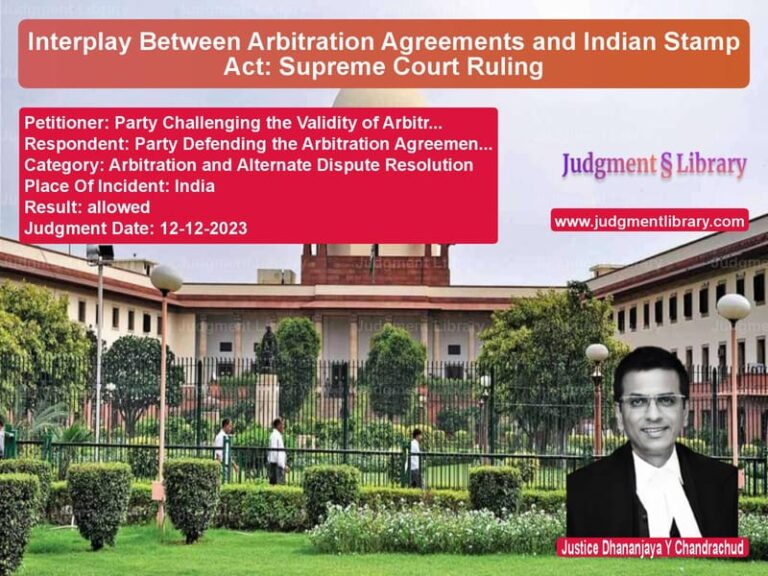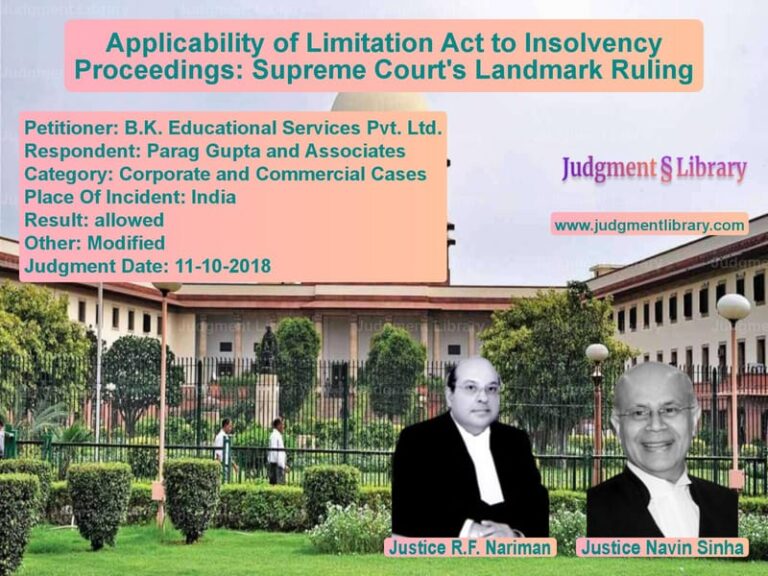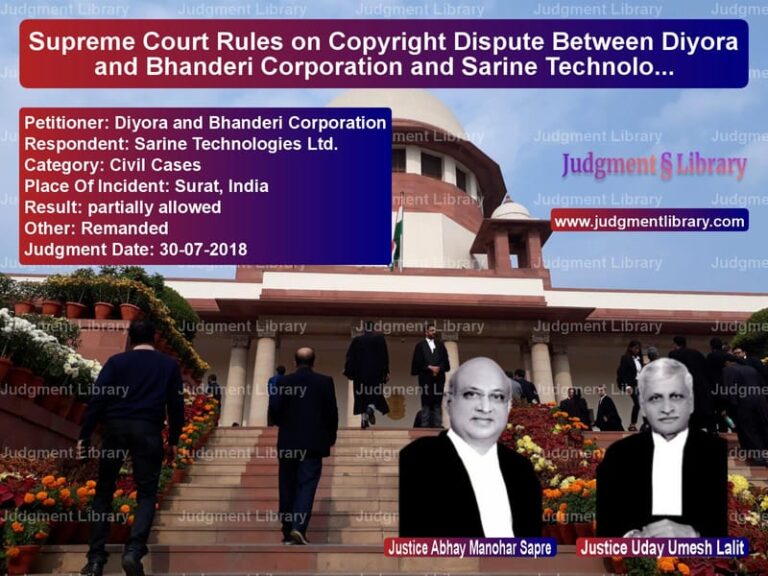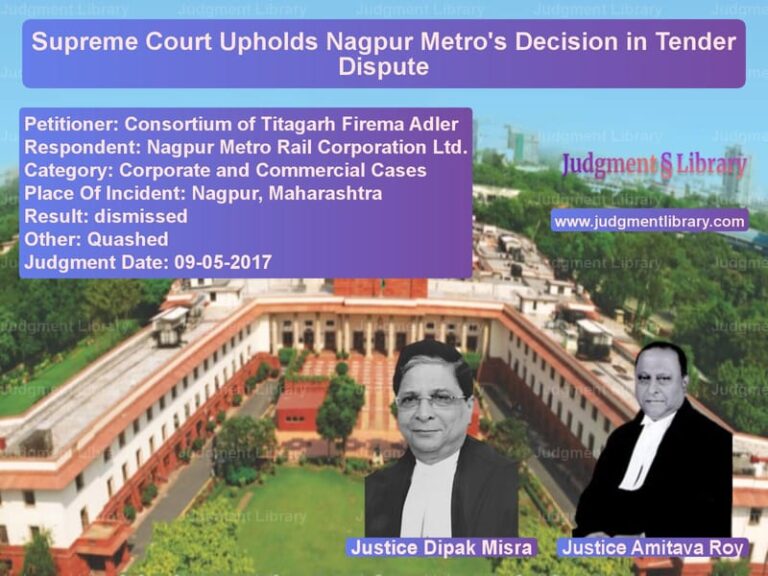Broadcasting Rights and Sports Telecast: Supreme Court’s Verdict on Prasar Bharati and Private Operators
The case of Union of India vs. Board of Control for Cricket in India & Others dealt with a crucial legal question regarding the mandatory sharing of live sports broadcast signals with Prasar Bharati. The Supreme Court examined whether private broadcasters, who have acquired exclusive rights through competitive bidding, are required to allow their signals to be transmitted through Prasar Bharati and further re-telecasted by cable operators. The verdict impacts sports broadcasting, intellectual property rights, and the balance between commercial interests and public access to sports events.
The core issue in this case was the interpretation of Section 3 of the Sports Broadcasting Signals (Mandatory Sharing with Prasar Bharati) Act, 2007 (hereinafter referred to as the “Sports Act, 2007”). The dispute arose when Prasar Bharati, India’s national broadcaster, sought access to live feeds of cricket matches for retransmission through its terrestrial and Direct-to-Home (DTH) networks. However, private broadcasters and the Board of Control for Cricket in India (BCCI) challenged this, arguing that such a practice undermined their exclusive commercial rights.
Background of the Case
Cricket is arguably the most popular sport in India, drawing millions of viewers across the country. The Board of Control for Cricket in India (BCCI) controls the organization of national and international cricket matches held in India and auctions broadcasting rights to private entities. In this case, Star India Private Limited had secured exclusive telecast rights from BCCI for the period between April 2012 and March 2018.
Under Section 3 of the Sports Act, 2007, private broadcasters are required to share live feeds of sports events deemed to be of “national importance” with Prasar Bharati. These feeds are then retransmitted on Doordarshan’s terrestrial network and its DTH platform. However, due to the operation of Section 8 of the Cable Television Networks (Regulation) Act, 1995 (the “Cable Act, 1995”), cable operators were also mandated to carry the Doordarshan channel, effectively allowing them to relay the live broadcast to their subscribers without directly paying for rights.
BCCI and its broadcasting partners argued that this practice violated their commercial rights. They contended that since private cable networks and DTH service providers benefited from free sports content via Doordarshan, it disrupted the commercial model of pay-TV broadcasting.
Arguments by the Petitioner
The Union of India and Prasar Bharati put forward the following arguments:
- The primary objective of the Sports Act, 2007 is to ensure that events of national importance reach the maximum number of viewers, particularly in rural areas.
- Prasar Bharati was created as a public service broadcaster and was legally mandated to provide free access to sports broadcasts.
- The law does not prevent private broadcasters from generating revenue through advertisements or other means.
- Requiring private broadcasters to share feeds with Prasar Bharati does not violate their commercial rights but rather aligns with national interest objectives.
- The combination of Section 3 of the Sports Act, 2007 and Section 8 of the Cable Act, 1995 ensures broader reach of important sporting events.
Arguments by the Respondents
The Board of Control for Cricket in India (BCCI), Star India Private Limited, ESPN Software India Pvt. Ltd., and other private broadcasters opposed the practice, arguing:
- The mandatory sharing of live sports feeds significantly affected their commercial revenues.
- Private broadcasters invest large sums in acquiring exclusive media rights, and this system disrupted their ability to monetize these rights through subscriptions.
- The interpretation of Section 3 of the Sports Act, 2007 should be limited to Doordarshan’s terrestrial and DTH networks, not cable operators.
- Cable operators, who had not paid for exclusive broadcasting rights, were benefiting from live sports feeds for free, leading to unfair commercial advantage.
- The obligation placed on private broadcasters was expropriatory in nature and must be strictly construed.
Supreme Court’s Observations
The Supreme Court bench, comprising Justice Ranjan Gogoi and Justice Navin Sinha, examined the matter in detail and observed:
“Section 3 of the Sports Act, 2007 mandates that live feeds must be shared with Prasar Bharati for retransmission on its terrestrial and Direct-to-Home networks. However, this does not extend to cable operators under Section 8 of the Cable Act, 1995.”
The Court emphasized that the “must share” obligation under Section 3 of the Sports Act, 2007 does not equate to a “must carry” obligation under Section 8 of the Cable Act, 1995. The Court ruled that Prasar Bharati’s retransmission should be confined only to its terrestrial and DTH platforms.
Furthermore, the Court addressed concerns about commercial rights and held:
“The revenue-sharing arrangement in the Sports Act, 2007 is meant to balance commercial and public interests. However, allowing cable operators to carry Prasar Bharati’s feed of live sporting events without proper licensing would unfairly impact private broadcasters.”
Legal Principles Affirmed
The judgment reaffirmed several important legal principles:
- Intellectual Property Rights: Exclusive broadcasting rights, once acquired, should not be diluted beyond what is explicitly mandated by law.
- Limited Interpretation of Statutes: The scope of a legal provision cannot be expanded beyond its textual meaning without clear legislative intent.
- Balance Between Public and Commercial Interests: While ensuring public access to sports, the law should not undermine the commercial viability of broadcasting contracts.
Conclusion
The Supreme Court dismissed the appeals filed by the Union of India and Prasar Bharati, affirming the Delhi High Court’s ruling that Doordarshan’s retransmission of shared sports feeds must be limited to its terrestrial and DTH networks. This judgment marks a crucial precedent in balancing the rights of private broadcasters with the government’s mandate to make sports events of national importance accessible to the public.
Don’t miss out on the full details! Download the complete judgment in PDF format below and gain valuable insights instantly!
Download Judgment: Union of India vs Board of Control for Supreme Court of India Judgment Dated 22-08-2017.pdf
Direct Downlaod Judgment: Direct downlaod this Judgment
See all petitions in Corporate Compliance
See all petitions in Company Law
See all petitions in Judgment by Ranjan Gogoi
See all petitions in Judgment by Navin Sinha
See all petitions in dismissed
See all petitions in supreme court of India judgments August 2017
See all petitions in 2017 judgments
See all posts in Corporate and Commercial Cases Category
See all allowed petitions in Corporate and Commercial Cases Category
See all Dismissed petitions in Corporate and Commercial Cases Category
See all partially allowed petitions in Corporate and Commercial Cases Category

